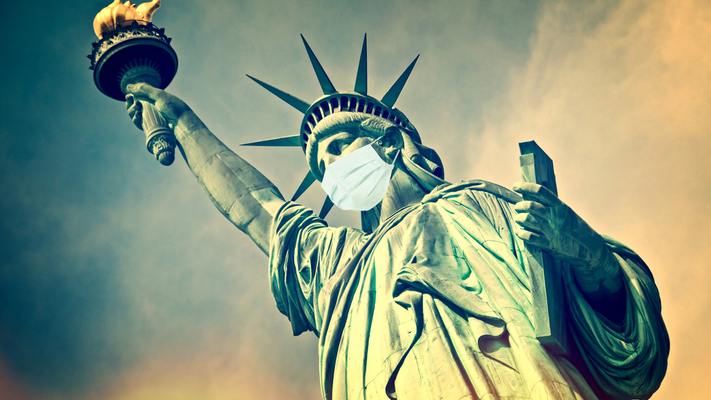
Pandemic Report No. 8
This is not the first time that a pandemic has struck hard at the United States. What is different today is how we have over-reacted with fear and panic. Let’s take a quick stroll through the history of the past 100 years and then see if we can draw some lessons about why our current reaction is so unprecedented.
1918
Known as the “Spanish flu,” this was the worst of the pandemics—killing 675,000 in the United States and 50 million globally–and is the one clear example of false depiction of the virus’s geographical origin. Indeed, it may have started in the United States, and Spain became a convenient scapegoat because of World War I censorship.
Perhaps the worst culprit was Democratic President Woodrow Wilson, using the Sedition Act and the Committee on Public Information to cover up the truth. (Wilson would be copied by FDR and George W. Bush, among others, in using lies to get America into wars of their choosing.) The ugly story of Wilson’s nefarious role, and how the 1918 flu spread across the world, is told in an exhaustive 2017 article in the Smithsonian Magazine by historian John M. Barry, author of The Great Influenza.
Adding to the confusion created by government disinformation was the primitive medical knowledge of that day regarding influenzas. As Mark Malvasi, professor of history at Randolph-Macon College, writes: “Not only did doctors struggle to treat it, but they were also at a loss about how to understand it….They did not know until 1933 that viruses cause the flu, and so they administered vaccines against a bacillus, the presumed cause, an antidote that proved futile.”
There were some community lockdowns, fear was widespread, and the Spanish flu had a major impact on America. But comparisons to today are complicated because of the primitive economic data from that era (relative to today) as well as that lack of understanding about the medical causes of pandemics.
Also, the world war was the paramount concern of that day—and the impacts of war and pandemic were inseparable. For example, John Dos Passos—one of America’s greatest novelists—wrote extensively about his war experiences, but barely noted that he had caught the disease on a troop ship. It was the same for Americans in general: War was the paramount concern and overshadowed the pandemic.
1957
The culprit this year was known as the “Asian flu” and killed 116,000 Americans. The population of the U.S. at that time was 172 million—a little more than half of our current population, so that figure of 116,000 deaths would be the equivalent of around 200,000 deaths today.
But as Jeffrey A. Tucker has noted, “What’s remarkable when we look back at this year, nothing was shut down. Restaurants, schools, theaters, sporting events, travel – everything continued without interruption. Without a 24-hour news cycle with thousands of news agencies and a billion websites hungry for traffic, mostly people paid no attention other than to keep basic hygiene. It was covered in the press as a medical problem. The notion that there was a political solution never occurred to anyone.”
1968-1969
According to the CDC, “the 1968 pandemic was caused by an influenza A (H3N2) virus… It was first noted in the United States in September 1968. The estimated number of deaths was 1 million worldwide and about 100,000 in the United States. Most excess deaths were in people 65 years and older.”
This pandemic was commonly known as the “Hong Kong flu.” My onetime colleague and longtime friend Gary Alexander has noted that it “killed almost twice as many Americans as died in the Vietnam War, but the news media hardly noticed the killer bug. There were no state or local lockdowns and the stock market remained firm during the flu’s peak.”
2020
This year’s Covid-19 pandemic has had roughly the same impact, or less, than the pandemics of 1957 and 1968. But we didn’t shut down the economy during those pandemics. In fact, most of us who were alive in those days barely remember the existence of those pandemics at all.
The reaction this year is even out of proportion to the Spanish flu of 1918, which had a much greater death toll. The American economy wasn’t shut down in 1918. We were much too busy and concerned with being on the winning side of that war, which required an expanding economy. Shutting down the economy would have been seen as treasonous.
So why have we over-reacted this year, so out of proportion compared to those previous pandemics? Let me suggest some of the reasons that come immediately to my mind. I’m sure there are more explanations, and you will have your own. Here are my initial thoughts.
Demographic changes (urbanization): America had some big population centers in 1918, but the U.S. was still mostly a rural society, with a slight majority of the U.S. population located in rural areas. Today that figure is down to less than 20%. The impact of pandemics is most noticeable in dense, big cities, so our trend toward urbanization has also increased our awareness of the effects of those pandemics.
Interdependence: With increased urbanization comes greater interdependence. People in big cities take less personal responsibility for their well-being, relying more on the specialized help of largely anonymous people–they know their neighbors to a much lesser degree than people in small town and rural areas. This anonymity of big-city living works fine in good times but gets scary in bad times, and especially during pandemics. You feel much less in control of getting the goods and services you need for survival.
Self-reliance: This is the flip side of interdependence. People in rural societies tend to have much greater knowledge and skills in how to take care of themselves, in tasks ranging from auto repairs to gardening. People in metropolitan areas tend to have specialized skills but far less “practical” skills.
As recently as World War II “victory gardens” were a big deal—and that’s how a state as urbanized as New Jersey became known as “the garden state.” Today that knowledge has been lost to city-dwellers except for a very few urban gardens. And knowing how to can and preserve vegetables and fruits used to be widespread, but is virtually nonexistent today. With that loss of self-reliance comes an increase in insecurity, and panic when supply lines are interrupted.
Those are societal changes that are pretty much beyond our ability to change in the short term. But there are other factors that could have been prevented—and weren’t.
Collectivist thinking: Americans have become much more socialist—or use the term of your choice—over the past century. We not only increasingly rely on governmental solutions to all problems in life, we tend to think that’s a natural and good trend. There are far too many explanations for this leftward trend to enumerate here, but let me mention one of the most important.
The dumbing-down of education: We are reaping the results of decades of growing government domination of education. From elementary school to graduate school, curriculums have been watered down and basic knowledge of American history and political principles has been supplanted by politically correct ideological indoctrination.
The managerial revolution: James Burnham, a former colleague and major influence on my thinking, became one of the three leading political scientists of the first half of the 20th century with his worldwide best-seller The Managerial Revolution. (The other two top political scientists, in my view, were George Orwell and Sidney Hook.) Way back in 1941, Burnham explained how power was drifting from capitalists to the managerial elites.
Fast-forward to today and we have the managerial elitists of “public health” dictating our response to the Covid-19 pandemic. Dr. Fauci—here’s looking at you. Someone who has never held a private-sector job, with responsibility for employees, is putting small businesses and their millions of employees out of business. And someone who has a secure government job and pension is telling those employees that dependence on government doles is now their future for an indeterminable period of time.
We may—may—need public health experts, but they should not decide government policy. To add salt to the wound, Dr. Fauci’s frequent changes in policy recommendations reveal that he doesn’t really know what to do about the pandemic. But a public health “expert” cannot admit that.
The revolutionary political agenda: The groundwork for this has also been long in the making, but it came to dominance in 2016. That’s when all the forces of the Left abandoned the idea that we settle our political differences with elections. The decision was made to nullify the election results with permanent guerilla warfare against the victors: four years of phony Russia probes, of impeachment efforts, and unconstitutional collusion between the Deep State (FBI, CIA, and the rest) with the losers.
The lockdown that tanked the U.S. economy is only the most recent phase in that conspiracy against democratic governance. The Left, from Hillary Clinton on down to your local political science professor, believes that a crisis is an opportunity to gain power. And Covid-19 was the perfect storm, the perfect crisis. Use it to bring down the economy—and to defeat the hated president.
(Personal note: I don’t say this as a partisan Republican. I did not vote for Donald Trump in 2016, and my last vote for a Republican presidential candidate in a general election was in 1984. I do say this as a true independent who holds both major parties to blame for our current situation.)
One final factor…
The media: The corporatist “mainstream” media today are simply an adjunct of the Democratic Party and the leftist agenda. There is no free press in America today except for a few small-circulation publications, talk radio, and some corners of the Internet, which the Silicon Valley moguls plan to censor to extinction.
Not only is there a near-complete leftist takeover of the media. Today’s media have vastly more power than during any of the previous pandemics—old media moguls like William Randolph Hearst never came close to the power and influence of Jeff Bezos today. And the media propaganda barrage is unceasing—24/7, as the saying goes. The goal is to fan the flames of fear in the American people, with government (their government, not yours) as the solution.
While we can differ on what we consider to be the main long-term causes of our discontent, I see this media propaganda barrage as clearly the main short-term reason why we have let the Covid-19 bug triumph over the American spirit.
So far. The battle is not over yet.
My Previous Articles on the Coronavirus Pandemic
- How Big of a Threat Is the Coronavirus? (March 26)
- How Bad Has the Pandemic Been? How Bad Will It Be? (April 6)
- An Economic Shutdown Based On…What? (April 15)
- Is Sweden’s Problem Coronavirus or Immigration? (April 21)
- Let the Lockdown End, County by County (April 27)
- Reopen the Economy and Protect the Most Vulnerable: We Can Do Both (May 4)
- The Best Defense Against Covid-19 is a Strong Immune System (May 15)
And see all my articles in this pandemic series.






